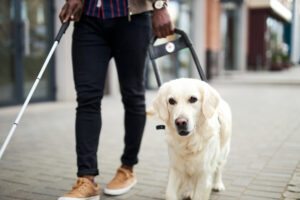
If we look back at history, not that far off, there was a period when the purpose of service animals was questioned, and they were barred from some schools. In 2009, a Michigan girl aged five diagnosed with cerebral palsy was not allowed to bring her service dog to school. The case was eventually brought to the Supreme Court, and the court sided with Ehlena changing how things are now.
The idea that the validity of service animals would be questioned in the first place was not only puzzling for me but also for Florida Agricultural and Mechanical student Abigail Bamping, who was diagnosed with depression.
“I think it’s very important; some people have disabilities or even emotional issues they’re dealing with, no matter if you have a disability registered, if you qualified for emotional service, there should be no reason why it should be denied,” said Bamping.
Defined under Florida law and the federal Americans with Disabilities Act (ADA), a service animal is a dog that has been individually trained to do work or perform tasks for an individual with a disability. Performed tasks according to the ADA can be anything from assisting individuals who are blind or have low vision with navigation, alerting individuals who are deaf or hard of hearing to the presence of people or sounds, providing non-violent protection or rescue work and pulling a wheelchair, etc.
With the way that laws are now, gone are the days when a person with a disability is barred from bringing their service dogs in public places such as restaurants, museums, hotels even on campus, of course, with the correct proper documentation.
Speaking with FAMU’s Cedar Programming Outreach Coordinator, Ms. Tyesha Thomas, accommodations can be made for those needing a service animal on campus. Students can feel out proper documentation provided on their iRattler by clicking the text box with the word ‘AIM’ (acessiblelearning.com); students will be taken to the first step of a two-step application process. After completion, students will be contacted by Assistant Director, Ms. Gwendolyn Johnson. This process may take between 5-7 days. For housing accommodation for service animals, Ms. Thomas says students must file another application.
“We’re all adults; it sounds terrible to say, but we’re not kindergarteners,” said Bamping.
At the end of the day, the question isn’t really about whether service dogs should be on campus. But, whether we act like adults coming together when the time comes to be understanding when someone needs extra accommodations.